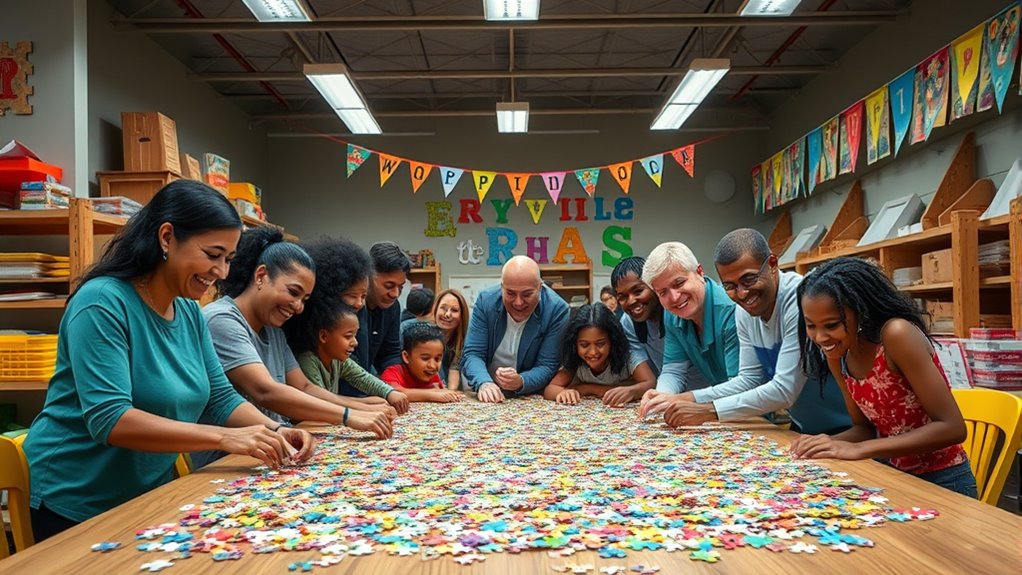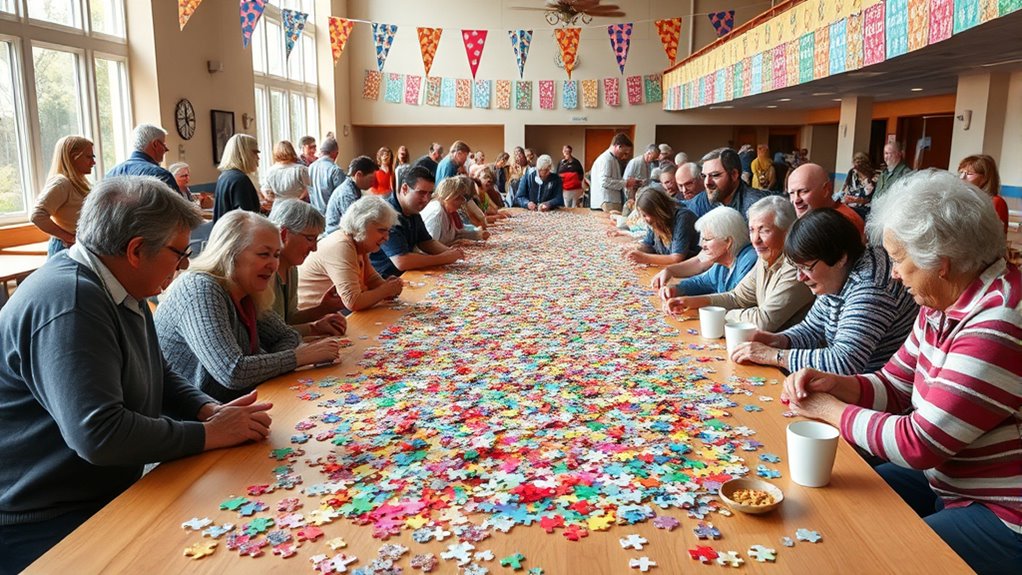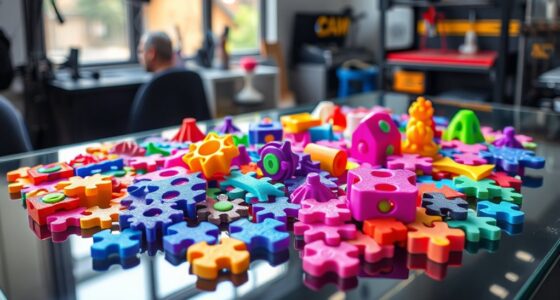To host a community puzzle challenge, start by balancing puzzle difficulty to keep participants engaged without causing frustration. Tailor challenges to your audience, offering different levels or hints to guarantee everyone feels included. Incorporate fun elements like timers, leaderboards, or collaboration opportunities to boost engagement. Create a welcoming environment, whether physical or virtual, and promote social interaction. To learn how to refine your event for maximum impact, keep exploring ways to inspire and energize your community.
Key Takeaways
- Tailor puzzle difficulty and offer hints to match community skill levels for sustained engagement.
- Create a central platform or space for updates, scoring, and community interaction.
- Incorporate interactive elements like timers, leaderboards, and team challenges to boost motivation.
- Promote collaboration and social sharing to foster community spirit and inclusivity.
- Gather feedback after the event to refine puzzle design and enhance future challenges.

Ever wondered how to bring your community together in a fun and engaging way? Hosting a community puzzle challenge is a fantastic option that encourages interaction, teamwork, and a little friendly competition. To make sure your event hits the mark, you need to carefully consider puzzle difficulty. If the puzzles are too easy, participants might lose interest quickly, feeling bored and disengaged. Conversely, if they’re too difficult, frustration can set in, causing participants to give up or feel discouraged. Striking the right balance is key. You want puzzles that are challenging enough to keep everyone thinking but not so hard that they become impossible to solve. Think about offering a range of puzzle difficulties or providing hints along the way to maintain participant engagement. This way, everyone stays motivated and feels their efforts are rewarded, regardless of skill level.
Balance puzzle difficulty to keep your community engaged and motivated for a fun, inclusive challenge.
When planning your challenge, consider the composition of your community. Are most participants casual puzzle solvers, or are they seasoned enthusiasts? Tailoring the difficulty level to your audience ensures more participants stay involved and enjoy the experience. You could also create a multi-tiered challenge, where teams or individuals start with easier puzzles and progress to harder ones. This setup encourages continued engagement as participants work their way through the levels, fostering a sense of achievement at each stage. Remember, the goal is to keep everyone actively participating without feeling overwhelmed or underwhelmed.
Participant engagement is essential for a successful community puzzle challenge. To boost it, make sure your event is lively and interactive. Use timers, leaderboards, or prizes to add a competitive edge that motivates participants to stay focused and involved. Incorporating social elements, like team-based puzzles or chat opportunities, helps build camaraderie among community members. Promoting collaboration over competition can also enhance engagement, especially if you emphasize fun and community spirit over winning. Be approachable and enthusiastic during the event, encouraging participants to share their progress and cheer each other on. Consider setting up a central space—either physically or virtually—where participants can see ongoing scores, share tips, or celebrate successes. These small touches can considerably increase participant engagement and make your puzzle challenge memorable. Additionally, leveraging Hackathons as models for structuring your event can inspire innovative formats that foster collaboration and excitement.
Finally, don’t forget to gather feedback afterward. Ask participants what they enjoyed most and where they think improvements can be made, especially regarding puzzle difficulty and engagement strategies. Use this insight to refine future events, ensuring your community puzzle challenge continues to grow in popularity and enjoyment. By thoughtfully balancing puzzle difficulty and creating engaging, inclusive experiences, you’ll foster a sense of community and make your puzzle challenge an event everyone looks forward to.
Frequently Asked Questions
What Types of Puzzles Are Best for Community Challenges?
You should choose a variety of puzzles like brain teasers and word puzzles to engage your community. Brain teasers challenge problem-solving skills, while word puzzles encourage creativity and vocabulary. Mix in visual puzzles or riddles to keep things interesting. By offering diverse puzzle types, you’ll appeal to different interests and skill levels, making your community challenge fun and inclusive for everyone involved.
How Do I Promote the Event to Attract More Participants?
Oh, you’d think promoting a community puzzle challenge is easy—just post once, right? Not quite! To really attract participants, leverage social media by sharing engaging updates and sneak peeks. Partner with local businesses or groups to widen your reach and add credibility. You can also create fun, shareable content and encourage community members to spread the word. With consistent effort, your event will fill up faster than you’d imagine!
What Safety Precautions Should I Consider for In-Person Events?
You should prioritize safety by evaluating event liability risks and implementing necessary precautions. Make sure there are clear emergency preparedness plans, including first aid stations and accessible exits. Keep a list of emergency contacts and train staff on safety procedures. Regularly inspect the venue for hazards, and communicate safety guidelines to participants. Taking these steps helps protect everyone and ensures a smooth, secure community puzzle challenge experience.
How Can I Encourage Team Collaboration During the Challenge?
You can encourage team collaboration during the challenge by designing activities that promote team building and effective communication skills. Break participants into diverse groups, assign roles, and encourage constant dialogue. Use puzzles that require collective problem-solving, and set goals that motivate teamwork. You might also introduce friendly competition to boost engagement, ensuring everyone feels valued and included. This approach fosters strong collaboration and improves communication among team members.
What Prizes or Incentives Motivate Participants Effectively?
You can motivate participants effectively by offering motivational rewards like gift cards, community recognition, or event privileges. Use diverse prize categories to appeal to different interests, such as best teamwork, fastest solver, or most creative solution. Clearly communicate these incentives upfront to boost enthusiasm. When participants see meaningful rewards aligned with their efforts, they’ll stay engaged and motivated to contribute their best during the challenge.
Conclusion
Hosting a community puzzle challenge is like planting a seed that blooms into connections and fun. You get to see neighbors come together, laugh, and solve mysteries side by side. Keep the energy lively, encourage teamwork, and celebrate every small victory. When you create this shared experience, you’re not just hosting a game—you’re building a stronger, more connected community. So, get ready to inspire and have a blast, because your challenge could be the spark that brings everyone closer.









